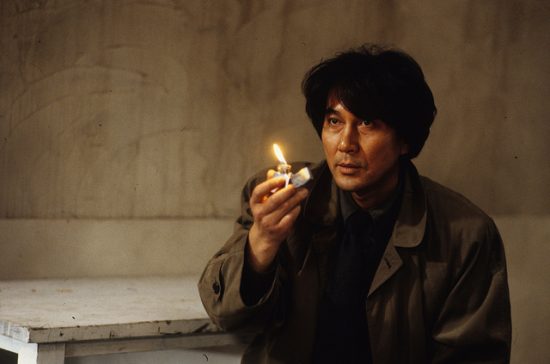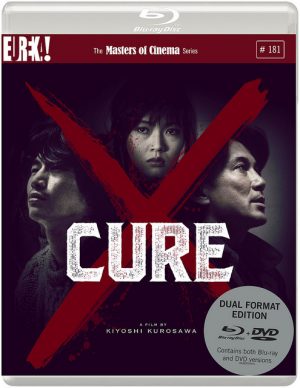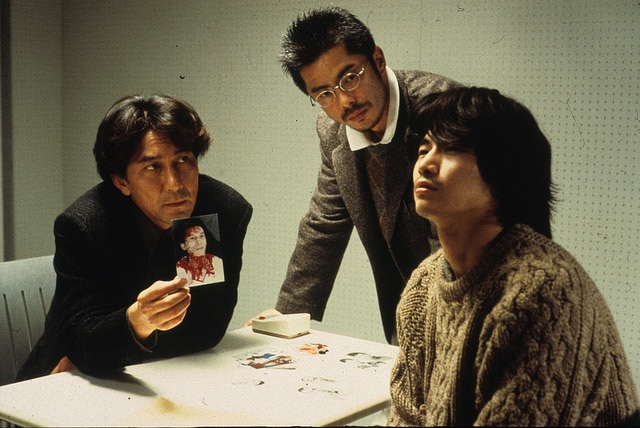 The 1990s may have been a boom period for the psychological thriller, but it’s debatable as to just how fitting a description that is to many of the films classed as such. In Hollywood, the bulk of them tended to be half-baked Silence of the Lambs knock-offs or sensationalised Hitchcock updates; in either case, the emphasis tended to be more on stylised scares and theatrics than really incisive drama that got under the skin and into the heads of both the protagonists and the audience. However, Japanese writer-director Kiyoshi Kurosawa’s 1997 film Cure – now getting its first UK home entertainment release thanks to Eureka’s Masters of Cinema imprint – is about as psychological a thriller as you’re ever likely to see.
The 1990s may have been a boom period for the psychological thriller, but it’s debatable as to just how fitting a description that is to many of the films classed as such. In Hollywood, the bulk of them tended to be half-baked Silence of the Lambs knock-offs or sensationalised Hitchcock updates; in either case, the emphasis tended to be more on stylised scares and theatrics than really incisive drama that got under the skin and into the heads of both the protagonists and the audience. However, Japanese writer-director Kiyoshi Kurosawa’s 1997 film Cure – now getting its first UK home entertainment release thanks to Eureka’s Masters of Cinema imprint – is about as psychological a thriller as you’re ever likely to see.
I’ll confess to having been unaware of the film before now (surely I can be excused, given the aforementioned lack of UK release before now), although I did see Kurosawa’s more recent film Creepy at Celluloid Screams 2016. It’s fair to say that Creepy plays out in a very similar manner to Cure: very quiet, slow and understated, but with a steadily building sense of unease that reaches levels of remarkable intensity without ever lapsing into melodrama. This being the case, Cure isn’t going to be to everyone’s taste – it certainly pushes me out of my comfort zone somewhat – but if you give it the attention it deserves, you may well find it a very rewarding, unnerving viewing experience.
 Kôji Yakushi is Kenichi Takabe, an outwardly calm and collected police detective living under tremendous pressure. At home, his wife Fumie (Anna Nakagawa) is struggling with the onset of early dementia; at work, he has a bizarre series of murders to investigate. The victims and the perpetrators seem to have no connection to one another, yet every murder fits the exact same MO with identical wounds, and in each case the murderer immediately confesses, claiming they didn’t want to do it but had no control over their actions. Takabe’s investigations soon lead him to Mamiya (Masato Hagiwara), an emotionally distant young man who seems to be suffering from short term memory loss, but has a strange charisma that makes all those who meet him struggle to resist his manipulations. The question is, can the tough but tormented Takabe hold out against Mamiya’s mesmerism long enough to stop the killing spree?
Kôji Yakushi is Kenichi Takabe, an outwardly calm and collected police detective living under tremendous pressure. At home, his wife Fumie (Anna Nakagawa) is struggling with the onset of early dementia; at work, he has a bizarre series of murders to investigate. The victims and the perpetrators seem to have no connection to one another, yet every murder fits the exact same MO with identical wounds, and in each case the murderer immediately confesses, claiming they didn’t want to do it but had no control over their actions. Takabe’s investigations soon lead him to Mamiya (Masato Hagiwara), an emotionally distant young man who seems to be suffering from short term memory loss, but has a strange charisma that makes all those who meet him struggle to resist his manipulations. The question is, can the tough but tormented Takabe hold out against Mamiya’s mesmerism long enough to stop the killing spree?
It’s easy to see from that synopsis how Cure might easily have been an altogether different affair given the Hollywood treatment, but Kurosawa and company handle things in an extraordinarily grounded, almost kitchen-sink realist style. Music is almost totally absent, and noticeable editing is also minimal, with most scenes playing out in single takes without too much camera movement. The performances, too, are very understated; the poker faced interplay between Kôji Yakushi and Masato Hagiwara builds in intensity so slowly, almost imperceptibly, that it genuinely throws you when things get heated. Even today, it’s not commonplace for such inherently pulpy fare to be treated in such a serious, naturalistic manner; it seems likely to have been fairly unprecedented back in 1997.
Again, many viewers may well find their patience tested by the ultra-quiet slow burn approach, but it’s well worth sticking it out. There’s much to be said for cinema that forces the audience to do a bit of work, and you’ll need to do just that with Cure, but it’ll be time and energy well spent, and likely to linger in your head for some time afterwards.
Cure is out now on dual format DVD and Blu-ray from Eureka Entertainment.
